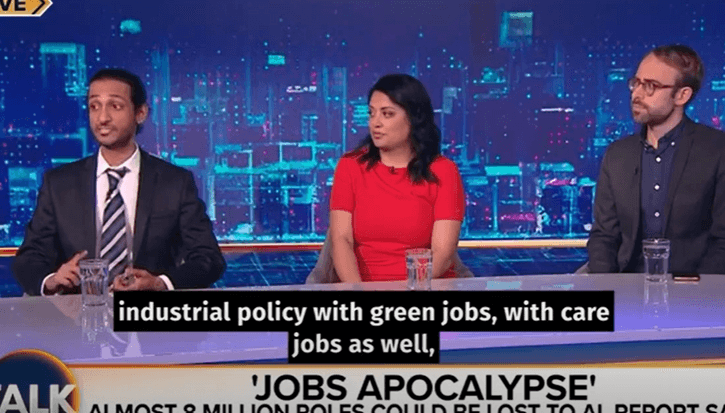Editorial: The Long Revolution
Article
The domination of UK political debate by Brexit has entered its fourth year. In the media, all policy areas are filtered through its lens. In Whitehall, it consumes governmental capacity; on the streets, protests from both sides grow in number – large and small, peaceful and more violent. Battles have raged over the terms of the withdrawal agreement, what Britain could or should be, and whether Brexit should even occur. But scant attention has been paid to what the vote, and the political events since the vote, say about and mean for our democracy.
When IPPR relaunched Progressive Review in 2017, one year on from the Brexit vote, we argued that a progressive future outside of the EU would require the recommencement of what Raymond Williams called ‘the long revolution’: “the steady, irreversible expansion of democratic voice and power through building or reforming institutions of society, market and state and a broadened definition of the political”. Almost two years on, there are stark disagreements over whether we are closer or further away from that ideal.
“Brexit has shaken the complacency of the political elite and forced them to listen to voters again”
Many liberals conclude that democracy is in crisis. The terms and the tone of political discourse have shifted, previous norms of conduct in office and trust in democratic institutions are dissolving, and the main UK parties are failing to achieve decisive wins at the ballot box – the supposed advantage of the first-past-the-post system. More fundamentally, constitutional crisis threatens as the process following the referendum vote has been beset by repeated moments of deadlock, and the principle of parliamentary sovereignty has come into conflict with sovereignty of ‘the people’.1 But to others, democracy has been resuscitated from the stupor of the past decades. Brexit has shaken the complacency of the political elite and forced them to listen to voters again. New possibilities abound, resulting from the new political cleavages precipitated by the vote and its destabilisation of the status quo.
Britain is not alone in navigating new political terrain as both coalitions and modes of politics evolve. In particular, populism has become a prominent force, from the US to Italy to Brazil. Populist movements around the world vary in their demands: in whether they are essentially anarchic in nature or led from the top; and on whether they seek an emancipatory future or – more commonly and worryingly – a world which is more closed, and indeed, fascistic. But they share a worldview and narrative that pits the people against an elite that controls a self-serving system.
Groups with very different politics and viewpoints are also adopting shared methods of mobilisation and rhetoric. In a world of globalised and social media, movements – progressive or otherwise – can draw energy and inspiration from friends and foe alike, furthering the cause of those they agree with and learning from the strategies of those who they do not. In Germany, both Aufstehen (a movement meaning ‘Stand Up’) and #NoGroKo, a campaign group internal to the Social Democratic Party (SPD) opposing a grand coalition, are said to have drawn inspiration from Momentum’s rhetoric and digital communications. The English Defence League (EDL) has adopted the powerful visual symbol of the ‘gilets-jaunes’, a movement that represents a much broader church than the EDL occupies in the UK.
Will these changes serve to resuscitate democracy, or do they pose a unique threat to its continued existence? The answer depends on whether public and political life is strengthened or weakened by these new political conflicts and their nature.
“As the neoliberal statecraft of both New Labour and Conservatives have decimated the public sphere, the set of topics up for debate has shrunk”
Politics is the means by which we organise society, given the presence of ‘political’ problems, or conflict between opposing interests and values.2 Properly functioning politics must allow space for disagreement and for debate. Brexit has exposed a fundamental problem with our political system in the UK: it does not facilitate the meaningful participation of everyone or foreground their disagreement. It has created a two-party system; until recently the two parties have vied for the centre ground, sidelining opinions outside of the dominant policy frame. As the date of the UK’s withdrawal from the EU has neared, calls have been made for politicians to seek consensus on issues of national importance; rather than expose and publicly debate irreducible differences, they should ‘stop playing politics’. As the neoliberal statecraft of both New Labour and Conservatives have decimated the public sphere, the set of topics up for debate has shrunk: what was formerly public has been resigned to the private sector or technocracy.
In response, movements associated with left populism today have sought to reassert the political in politics. They share a common approach of constructing an enemy, or elite, through political narratives, surfacing and politicising social antagonisms. These narratives target the power relations that mean society is often ‘rigged’ in favour of the few. Some liberals see this framing as conspiratorial, but it is hard to refute that elites in some arenas actively set the rules for their own benefit, from lobbying to paying for education to reinforce their children’s social position.
Setting up a movement in opposition to an enemy elite also galvanises supporters. As Bonnie Honig has described in this journal: “unstable and marginal political movements or tumults conjure up the passion and loyalty that fidelity to procedure postulates. And they also provide the imagination and fantasy of possible and alternative futures that bring people into politics, sweep them up into movements or give them a reason to participate.”3
But, in the tumult, important differences can get lost. Not all opponents are enemies of democratic will; some are adversaries who might share (some) values, but different beliefs on how they’re best achieved. Others might be open to persuasion. A movement that is always in ‘friend/enemy’ mode will miss the opportunity to build hegemony by defining those it needs to persuade – either of its ideas, or of the movement’s credibility – as enemies.
“we are yet to work out how to reconfigure our political and democratic institutions to expand and open up political life, and to contest the hegemony of the present while facilitating debate”
The task is instead to construct a shared identity – and correctly identify those who wish to undermine democracy – but not to push out pluralism in the process.4 That will mean using different rhetorical tools for different occasions: persuasion for adversaries, attack for enemies, and the rhetoric of unity for when divisions need to heal, as they sometimes do. The last of these is particularly pertinent for leaders who gain power. It will mean challenging our democratic institutions to better serve public life, without undermining the idea that institutions can be trustworthy. It will mean ensuring debate is sufficiently available and open for the emergence of critical friends, and for movements to hone their arguments and ideas through engagement with those who disagree.
Our political institutions and norms have been thrown up in the air by Brexit and the discontent it has forced Westminster to confront. We cannot and should not go back. But as the pieces fall back down to earth, we are yet to work out how to reconfigure our political and democratic institutions to expand and open up political life, and to contest the hegemony of the present while facilitating debate. The articles in this issue begin this process by considering the state of democracy in the UK and how it can be strengthened.
Many of the themes above play out daily on social media, where competition for attention is high and nuance easy to miss. In their pieces, Rafael Behr and Joe Mitchell examine the potential and threat of recent technologies to democracy. Behr argues that twitter offers a snapshot of what is to come if we allow the degradation of norms of civil exchange. Joe Mitchell explores the potential of digital tools to strengthen the public sphere and warns that we beware those presenting utopian – or dystopian – visions of what digital technology will do to democracy. In his review of Will Davies’ ‘illuminating’ Nervous States, Nick Pearce evaluates the argument that emotion has taken over from reason in politics as a symptom of modernity, and that this is driving the rise of 21st century populism and rejection of experts.
What does it mean to expand the political? An important future avenue for democratic expansion will be to recognise the political nature of our economic lives and extend democracy to the economic sphere. In their piece, Joe Guinan and Martin O’Neill discuss the promise of community wealth-building, and how it could seed a democratic alternative to neoliberalism both in the ‘laboratory’ of the local economy and at the national level.
Deepening democracy will require reclaiming decisions currently made behind closed doors, bringing them back into the public realm. The process by which visions of Brexit have been developed and promoted has revealed how lobbyists continue to bypass politics to serve their own interests, shaping decisions that should be political and visible. In her piece, Tamasin Cave sets out how we can reclaim those decisions for the political sphere. But transparency is not always sufficient. Linda Arch writes about the financial system and its responsibilities to the public, arguing that trust is a necessary component within regulatory structures if we are to avoid endless bureaucracy. Who regulates the regulator?
Many debates regarding the health of our democracy – whether on populism, nationalism, or identity politics – centre on our understanding of ourselves as belonging to groups. Stephen Reicher appraises the psychology of groups and democracy. He argues that democracy is impossible without groups, but that when we describe opponents as outside of the common, political community, democratic debate begins to rot. Often the political community can come into conflict with internal interest groups as well as the individual; this is currently playing out in debates on whether gender is individually or collectively defined and understood. In her piece, Davina Cooper argues that we need to move beyond interest-based approaches to gender, and accept plural understandings of what constitutes gender.
“our institutions are ill-equipped to enfranchise those who will be most affected by decisions taken today: future generations”
As the UK reflects on the Brexit vote and process, and looks to the future, it is clear our democratic institutions require scrutiny and change. Jessica Garland begins this process, examining what is wrong with the Westminster model and how it must be recast. As well as today’s voters, our institutions are ill-equipped to enfranchise those who will be most affected by decisions taken today: future generations. To counter this, the Welsh government has introduced a Future Generations Act and commissioner; Carys Roberts interviews Sophie Howe to ask how this is shaping Welsh policymaking and democracy. In his piece, John Curtice examines the democratic efficacy of the EU referendum and the process that has followed it, assessing whether implementation has been true to the preferences revealed by the Brexit vote.
The referendum supposedly facilitated the expression of democratic will. But rather than providing the space for democracy to thrive, it has superficially divided society into two camps, and accentuated differences rather than shared ground. To respond to the faults in our public life that Brexit has exposed, we must seek to rejuvenate and extend our democratic institutions to expose and challenge hegemonic forces, while enabling the expression of conflict and disagreement. We hope this issue provides food for thought during this long revolution.
Carys Roberts and Laurie Laybourn-Langton
- Mouffe C ‘Agonistic Democracy and Radical Politics’, Pavillion Magazine. See: http://pavilionmagazine.org/chantal-mouffe-agonistic-democracy-and-radical-politics/
- See: https://www.ippr.org/juncture/juncture-interview-bonnie-honig
- See: Mouffe C ‘Agonistic Democracy and Radical Politics’, Pavillion Magazine. http://pavilionmagazine.org/chantal-mouffe-agonistic-democracy-and-radical-politics/
Related items

Forging ahead: Deciding the direction of IPPR's Migration Policy Unit
In our last blog post for the Migration Policy Unit we shared our new way of working as we endeavour to be inclusive and transparent in our policymaking process. In this blog we set out what our first and flagship project is for the policy…
Who gets a good deal? Revealing public attitudes to transport in Great Britain
Transport isn’t working. That’s the message from the British public. This is especially true if you’re on a low income, disabled or living in the countryside. The cost of living crisis has exposed the shortcomings of our transport system,…
Bhargav Srinivasa Desikan on TalkTV discussing AI
IPPR's Bhargav Srinivasa Desikan on TalkTV discussing his new report on the impact of generative AI on the UK labour market.